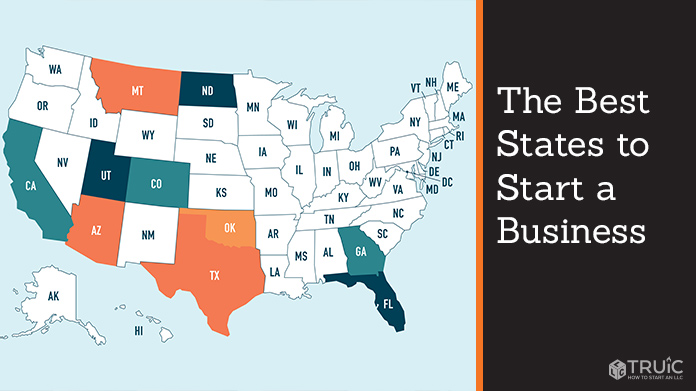The 10 Best States to Start a Business
99.9% of all businesses in the United States are small businesses, and each year roughly 600,000 new small businesses are started, according to the Small Business Administration (SBA). There are many factors that contribute to successful startups, but one of the biggest is the favorability of the state toward small business.
Read on for the best (and worst) states to start a business in the US.
Recommended: Read our full guide on how to start a business.

Best States to Start a Business
1. Texas
Entrepreneurs are flocking to Texas to start small businesses, and it’s no secret why: Texas has seen tremendous growth in the past decade. This state boasts the second-highest growth rate in state gross domestic product (GDP) as well as a 7.7% increase in the working-age population over the course of only five years.
One of the biggest draws for the 2.7 million small businesses that call Texas home is the low-tax burden. The 2019 State Tax Climate Index secured no individual or corporate income tax in Texas. Additionally, Texas offers a reasonable cost of living and a skilled workforce due to the number of large cities and universities in the state, making hiring qualified workers easier than other states.
Learn how to start a business in Texas.
2. Utah
Utah has seen huge growth in recent years with a working-age population growth of 9%, and that is just one of the things that make the beehive state one of the best places to start a small business in the US. In addition, Utah has a tremendous amount of venture capital available to new businesses, with 101 businesses in 2019 receiving roughly $11. 5 million in funding for a total of $1.16 billion invested, according to SeekCapital.
Moreover, Utah’s small business-friendly taxes are especially beneficial to corporations. However, LLCs pass their profits and losses onto members’ personal tax returns. The corporate income tax rate is relatively low at 4.95%, which was lowered from 5% in 2018.
Learn how to start a business in Utah.
3. Georgia
Another state with a high level of venture capital available to small businesses is Georgia. With 112 companies receiving roughly $10.2 million per business for a total of $1.14 billion invested, Georgia is on the rise as one of the best states to start a business in the US.
The percentage of the population that started a business in Georgia is higher than the national average at 42%; however, the survival rate for small businesses in this state is lower at 76.12%. As far as the business tax climate goes, Georgia lowered its corporate income tax from 6% to 5.75% in 2020. This, coupled with the low cost of living in the state and the high rate of entrepreneurship due to opportunity rather than a necessity, makes it a great place to start a small business.
Learn how to start a business in Georgia.
4. Montana
Perhaps the biggest draw for entrepreneurs starting businesses in Montana is zero income tax. Additionally, startups in Montana save big in labor costs as the treasure state has the second-lowest-cost of real labor compensation in the US at $31.56 on average.
Montana also boasts a low cost of living and an exceptional workforce. Moreover, the quality of life in Montana results in higher employee retention than in other states.
Learn how to start a business in Montana.
5. Oklahoma
With .39% of the state’s population starting a new business in Oklahoma, the ratio of entrepreneurs to population is higher than the national average. This is probably due to the fact that Oklahoma boasts one of the best business climates for startups in the US.
A few of the benefits Oklahoma has to offer small business owners are venture capital and a higher survival rate than other states. In 2018, Oklahoma was home to only four businesses receiving venture capital; however, each of these businesses received roughly $4.8 million per company. Additionally, startups in Oklahoma have a survival rate of 81.51%, making them the third-best in the country.
Learn how to start a business in Oklahoma.
6. Florida
Florida is known for its tax-friendliness due to its zero income tax for individuals and only 5.5% corporate income tax; one of the reasons entrepreneurs make up .46% of the state’s population.
Additional benefits to starting a business in Florida include low real labor compensation costs per hour and a history of successful small businesses starting with an average of only $5,000 in startup capital. This doesn’t mean there is a shortage of employees for startups; small businesses in Florida create an average of 6.41 jobs within their first year.
Learn how to start a business in Florida.
7. North Dakota
North Dakota has experienced tremendous growth in the last couple of years, with the state’s GDP growing 3.9% between the first quarter of 2018 and the first quarter of 2019. This isn’t the only exceptional thing about entrepreneurship in North Dakota — the state is also home to an exceptional workforce with a labor force participation percentage of 69.6% — the highest in the US.
Corporate income tax in North Dakota is broken up into the following brackets: 1.41% for businesses with an income of $0 to $24,999, 3.55% for businesses with an income of $25,000 to $49,999, and 4.31% for business with an income above $50,000. Relatively low corporate income tax rates and low cost of living add to the appeal of starting a business in North Dakota.
Learn how to start a business in North Dakota.
8. California
With .45% of the population starting businesses in the state, California has the second-highest rate of new entrepreneurs in the country. Fortunately, the state also has one of the highest rates of small business survival in the country as well.
The golden state also boasts a huge amount of venture capital available to businesses, with 2,869 businesses receiving roughly $9.7 million each for a total of $26.9 billion invested. However, the biggest drawback for entrepreneurs in California is the tax climate that ranks as one of the worst in the country, with an 8.84% corporate income tax rate.
Learn how to start a business in California.
9. Arizona
Along with its transition into a retiree destination, Arizona’s working-age population has grown 6.8% in the last several years. This isn’t the only area reporting growth in the state; however — Arizona’s economy is growing rapidly with a 3.8% GDP growth rate from 2018 to 2019.
Arizona boasts a low cost of living, lower labor costs than other states, with a real labor compensation rate of $35.75 per hour and a reasonable corporate income tax rate of 4.9%. The biggest drawback to starting a business in Arizona is the startup survival rate that is substantially lower than other states in the US.
Learn how to start a business in Arizona.
10. Colorado
A startup survival rate of 81.12% and a reasonable corporate income tax rate of 4.63% make Colorado one of the best states to start a small business. A large percentage of the working population is college-educated. However, Colorado doesn’t have the strongest percentage of human capital, according to WalletHub. Fortunately, the rate of the working-age population has grown exponentially at a rate of 7.6% in the past several years.
Colorado is an economically sound state to start a business with exceptional GDP growth between 2018 and 2019. Overall, this state offers lots of opportunities for startups to succeed.
Learn how to start a business in Colorado.
Worst States to Start a Business
- Rhode Island
- Connecticut
- New Jersey
- Maine
- Alabama
- Maryland
- New Hampshire
- Arkansas
- Louisiana
- Pennsylvania
1. Rhode Island
Rhode Island is home to the lowest percentage of entrepreneurs at .12% of the population as well as the lowest survival rates for startups during both the first year and first five years — all statistics that don’t speak to the state’s small business environment.
Additionally, with a population that is growing rapidly past working-age, hiring for a small business in Rhode Island can be challenging.
Our comprehensive guides make it easier to start a business. Learn more about starting a business in Rhode Island.
2. Connecticut
Another less-than-friendly state for small businesses, Connecticut ranks poorly for having both the worst five-year survival rate for small businesses of any state at 44.3% and the highest business property taxes in the US.
Like many New England states, including Rhode Island, Connecticut’s working-age population is aging, making hiring difficult. In addition to this, the state has a high cost of living as well as a real labor compensation rate of $43.68 which means labor is also more costly here than in other states.
Our comprehensive guides make it easier to start a business. Learn more about starting a business in Connecticut.
3. New Jersey
Like its East Coast neighbors Connecticut and Rhode Island, New Jersey has a decline in their working-age population, a poor survival rate for startups, and high labor costs. This, coupled with a decrease in the growth rate of business establishments, makes New Jersey one of the worst states to start a business.
However, New Jersey does have something to offer small businesses — venture capitalists. In 2018, businesses utilizing venture capital to fund their business received roughly $8.8 million per business for a total of $732.01 million invested.
Our comprehensive guides make it easier to start a business. Learn more about starting a business in New Jersey.
4. Maine
Maine has a small workforce with a working-age population that is on the decline. This state also has higher tax rates, with corporate income tax ranging from 3.5% to 8.93% and property tax higher than the national average at 1.35%.
Finally, the survival rate for small businesses in the first year is only 72.24% in Maine — a comparatively low rate compared to the rest of the country.
Our comprehensive guides make it easier to start a business. Learn more about starting a business in Maine.
5. Alabama
Business growth in Alabama is far lower than the national average at .21%, compared to .32%. Still, the state does boast a higher small business survival rate of 52.1% despite being negatively impacted by recent tariff policies.
Unfortunately, venture capital-funded businesses may struggle to find funding sources, and the amount of investment that is available has historically been low.
Our comprehensive guides make it easier to start a business. Learn more about starting a business in Alabama.
6. Maryland
Unfortunately, many small businesses in Maryland are opened out of necessity rather than opportunity, and the state’s five-year startup survival rate is only 48.7%. The business tax climate in the state is also unfavorable, with a corporate income tax rate of 8.25% — one of the highest in the country.
One benefit of starting a business in Maryland is the amount of venture capital available. In 2018, 131 businesses in Maryland received $10.5 million each for a total of $1.37 billion invested, which is great news for venture capital-funded businesses.
Our comprehensive guides make it easier to start a business. Learn more about starting a business in Maryland.
7. New Hampshire
The business tax climate in New Hampshire offers the benefit of no state sales tax, but the state’s corporate income tax is high at 8.2%. The percentage of the population that are entrepreneurs is much lower than the national average, and startups create far fewer jobs than other states as well.
Additionally, New Hampshire doesn’t have a high survival rate for small businesses in their first year, with only 76.86% surviving.
Our comprehensive guides make it easier to start a business. Learn more about starting a business in New Hampshire.
8. Arkansas
Hiring for your small business in Arkansas can be challenging due to its low labor participation rate. Unfortunately, the percentage of the population in Arkansas that start small businesses is also lower than the national average at only .29%.
The state’s business tax climate is fair, with a corporate income tax rate ranging from 1% to 6.5%, depending on income. Additionally, GDP growth has been moderate at 2.5% between 2018 and 2019.
Our comprehensive guides make it easier to start a business. Learn more about starting a business in Arkansas.
9. Louisiana
Similar to Arkansas, hiring in Louisiana can be challenging due to its small labor force and an aging population, resulting in a decrease in the working-age population. The business tax climate varies in favorability, with a corporate income tax rate of 4% to 8% depending on income.
In addition to this, Louisiana has the least educated population of any state, and more businesses in the state in recent years were started out of necessity rather than opportunity.
Our comprehensive guides make it easier to start a business. Learn more about starting a business in Louisiana.
10. Pennsylvania
Like many of the states on this list, Pennsylvania’s population is aging, resulting in a smaller working-age population and, therefore, a smaller workforce. The state’s business tax climate is one of the worst in the country, with a corporate income tax rate of 9.99%.
Pennsylvania also has a low percentage of startups per population and sees little job creation from startups.
Our comprehensive guides make it easier to start a business. Learn more about starting a business in Pennsylvania.
Start a Business in Your State
- Alabama
- Alaska
- Arizona
- Arkansas
- California
- Colorado
- Connecticut
- Delaware
- Florida
- Georgia
- Hawaii
- Idaho
- Illinois
- Indiana
- Iowa
- Kansas
- Kentucky
- Louisiana
- Maine
- Maryland
- Massachusetts
- Michigan
- Minnesota
- Mississippi
- Missouri
- Montana
- Nebraska
- Nevada
- New Hampshire
- New Jersey
- New Mexico
- New York
- North Carolina
- North Dakota
- Ohio
- Oklahoma
- Oregon
- Pennsylvania
- Rhode Island
- South Carolina
- South Dakota
- Tennessee
- Texas
- Utah
- Vermont
- Virginia
- Washington
- Washington D.C.
- West Virginia
- Wisconsin
- Wyoming


